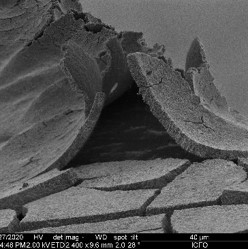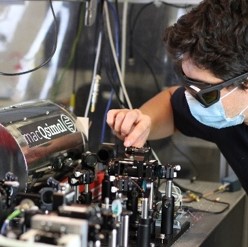ICFO decide game
Group 5 – Participant 6
Story cards
Read all the cards from this category, choose the one that looks more interesting to you and explain it to the rest of the group.
david díaz
Story Card 1
I'm an accountant and I'm very interested in science. That's why I often watch TV shows about technology. A few weeks ago, I saw Prof. Lluis Torner, director of ICFO, explaining that a smartphone uses things that have earned more than 20 Nobel photonic prizes, which make cameras, sensors, screens possible, as well as the technology used to manufacture microcircuits and many of their components, and to make the Internet possible. Who would have guessed that I had so much photonics in my pocket!
information and cYberseCurity
pere puig
Story Card 7
I like to feel safe when driving, so I'm happy with any safety innovation. For example, I'm thrilled to have infrared light sensors in my new car that help me park and alert me when a car gets too close, avoiding scares and even some accidents!
In a few years, I hope to be able to buy a self-driving car that drives me around: finally I’ll be more calm and relaxed when I’m stuck in traffic, because the car will do all the work. Much of the obstacle detection work will be done by infrared photon pulses, maybe even detected by graphene cameras!
information and cybersecurity
stephan schultz
Story Card 8
I’m training to run the Barcelona Marathon. To improve my training, I bought a bracelet to monitor my heart rate at all times. The other day, flipping my bracelet, I noticed that there was a green light on the side that touches my wrist: as it couldn’t be decoration, I researched a bit on the internet and discovered that the wearable device gets the information about my pulse by measuring the green photons that interact with my skin.
information and cybersecurity
health
info cards
Read all cards from this category, choose the two that look more interesting and explain them to the rest of the group.
nanotechnology
Info Card 9
If we split the diameter of a hair into a thousand parts, we would get to the scale of the nanoparticles that are made in ICFO. Despite being so small, these particles are useful for different innovative technologies.
At ICFO, many people are exploring the nanoworld, trying to improve our knowledge of the new phenomena that emerge at this tiny scale. They also aim to develop new technologies, such as new materials for mobile phones and wearable devices, diagnostics and treatment of diseases, sensors of photons and solar cells.
Photo: Carbon structure seen with an electron microscope. Some nanotubes can be seen inside the "cave".
photonics everywhere
shedding light on covid-19
Info Card 15
During the first big wave of the COVID-19 pandemic, an ICFO team worked intensively with a medical team at Parc Tauli Hospital near Barcelona to test a new idea: to evaluate with photonic devices microvascular dysfunctions in COVID-19 patients.
This could be a low-cost, non-invasive option for patients and easy to use for healthcare professionals to help establish the best treatment during the different phases of COVID-19 and help customize treatments. The project spread to different countries around the world and was even selected to be one of the 23 scientific projects funded by the European Union in the late summer of 2020 to deal with the pandemic.
Photo: ICFO scientists testing the equipment before sending it to hospitals
health
shedding light on covid-19
Info Card 15
During the first big wave of the COVID-19 pandemic, an ICFO team worked intensively with a medical team at Parc Tauli Hospital near Barcelona to test a new idea: to evaluate with photonic devices microvascular dysfunctions in COVID-19 patients.
This could be a low-cost, non-invasive option for patients and easy to use for healthcare professionals to help establish the best treatment during the different phases of COVID-19 and help customize treatments. The project spread to different countries around the world and was even selected to be one of the 23 scientific projects funded by the European Union in the late summer of 2020 to deal with the pandemic.
Photo: ICFO scientists testing the equipment before sending it to hospitals
health
improving our perception of the world
Info Card 24
The small changes that light undergoes when crossing different materials can help us measure with high accuracy many characteristics of the world around us, such as distance and temperature.
At ICFO we work to obtain very resistant sensors to measure temperature and electric fields in extreme conditions, such as a fire.
We also investigate how to build ultra-sensitive sensors thanks to the properties of quantum physics, such as a scale that can detect the presence of just one atom with carbon nanotubes or cold atoms that could measure the small magnetic fields generated by our brain.
Photo: Prototype of an ultrasensitive quantum magnetic field sensor.
information and cybersecurity
artificial intelligence for the advancement of science
Info Card 25
We are used to movie or music platforms suggesting us what to watch or listen to next. This is possible because algorithms can learn, if we give them a series of initial examples: it is a branch of artificial intelligence called machine learning.
Apart from improving technological services, machine learning is also very useful for people looking for solutions to complex scientific problems. At ICFO we use artificial intelligence to find new strategies to solve complex quantum physics problems, predict the motion of individual particles (very important for biology), or increase computational speed (optimization) for some complex algorithms that apply to significant day-to-day problems.
information and cybersecurity
thinking cards
Read all the cards from this category, choose the one that looks more interesting to you and explain it to the rest of the group.
can we predict the future?
Thinking Card 8
In the 1960s, most futuristic representations for the years around 2000 included flying cars. Now, more than twenty years later, our expectations for the future have changed quite a bit.
Does it make sense to listen to someone who promises that their field of study will bring us the technology of the future? Can we really make predictions about the future of science and technology?
global science
Thinking Card 14
Science is an international activity: the vast majority of scientific discoveries are made by multinational teams and result from collaborations between institutes and companies in different countries.
People in the world of science often move to expand their experience, so it is very common to find people from different countries in a research center. The cultural mix creates an open and tolerant environment that helps the creation of new and original ideas that allow research advancement.
So does it make sense to associate an important scientific discovery with a country, as we can often read in the news?
DECISIon
The time and resources available to solve important problems affecting society are limited. Imagine being part of the commission that has to decide how to invest the money for photonics research at European level for the coming years: knowing that photonics benefits society in many different ways, how would you distribute funds among the different research fields in photonics?
This is not an individual decision: each group must come to a unanimous conclusion by discussing correctly and rationally based on the facts that you have learned so far. There is no right or wrong answer. Like many things in life, it depends on the point of view you assume, the priorities you set, ...
light for health
Option 1
The pandemic that arose in 2020 taught us that public health is an important sector that affects many more aspects of society. A tiny virus can affect the lives of millions of people in all its aspects, not only health, but also the economy, industrial structure, labor market ...
That’s why it’s important to focus most of our efforts on research projects that can improve and care for people’s health.
light for information and cybersecurity
Option 2
We live in the information age. More and more companies and institutions are collecting and analyzing large amounts of data to improve industrial processes and services for the population. In addition, digital technologies are essential to communicate with each other, whether for work or fun. If information systems fail, strategic structures such as energy networks, traffic control, hospitals, governments, etc. fail, too. Thus, ensuring data security for quick and massive data transfer is of fundamental importance for a digitized society like ours.
That is why it is important to focus most of our efforts on research projects that can improve data collection, analysis, transmission and security.
light for energy and the environment
Option 3
We are in the middle of a climate emergency: to be able to solve it we need new environmental policies and the commitment of society as a whole. Science and technology can accelerate the change of paradigm that we need to save the planet with discoveries and innovative technologies. If we do nothing now, the Earth will be uninhabitable and unsustainable, but there’s still time.
That’s why it’s important to focus most of our efforts on research projects that can help us take care of our planet.
photonics everywhere
Option 4
Photonics is everywhere and has a positive impact in many different aspects of our lives. Sometimes, the same technology (such as the laser) can improve health, information and care for the environment at the same time. There are many global issues and it is difficult to set a priority, especially because they are interconnected.
That’s why it’s important not to focus our efforts on a single field of application: it’s better to diversify our efforts to have more chances of success.













